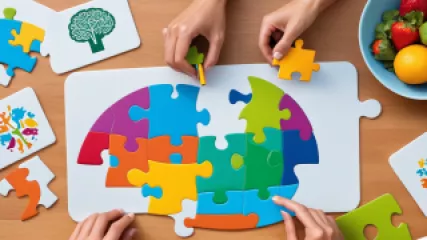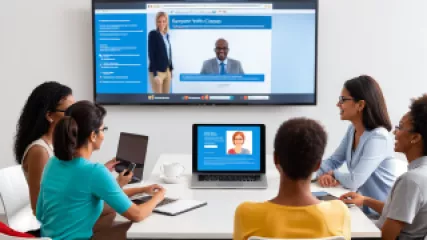Cognitive Development
Enhancing Cognitive Skills Through Online Workshops
Introduction
In today's fast-paced and ever-evolving world, cognitive development plays a crucial role in shaping our ability to learn, adapt, and thrive. Cognitive skills encompass various mental processes such as attention, memory, problem-solving, and decision-making. The good news is that with the advent of technology, online workshops have emerged as an effective means to enhance cognitive skills. In this guide, we will explore how online workshops can contribute to cognitive development, provide step-by-step instructions on how to engage in these workshops, and discuss the benefits of incorporating them into your routine.
Section 1: Understanding Cognitive Development
Before we delve into the realm of online workshops, it is essential to grasp the concept of cognitive development. Cognitive development refers to the growth and refinement of cognitive skills throughout our lives. It starts from infancy and continues into adulthood, evolving in complexity and sophistication.
During childhood, cognitive development is characterized by significant milestones such as language acquisition, problem-solving abilities, and logical reasoning. As we transition into adolescence and adulthood, cognitive skills expand further to include critical thinking, decision-making, and abstract reasoning.
Section 2: The Role of Online Workshops in Cognitive Development
2.1 What are Online Workshops?
Online workshops are virtual learning experiences designed to provide participants with interactive sessions focused on specific topics or skills. These workshops are facilitated through webinars, video conferences, or pre-recorded materials, allowing individuals to engage in learning from the comfort of their own homes.
2.2 Benefits of Online Workshops for Cognitive Development
Online workshops offer numerous advantages when it comes to enhancing cognitive skills:
a) Flexibility: One of the key benefits of online workshops is the flexibility they offer. Participants can engage in learning at their own pace and convenience, fitting it into their busy schedules.
b) Access to Expertise: Online workshops often feature renowned experts in their respective fields, providing participants with access to valuable insights and knowledge.
c) Interactive Learning: Many online workshops incorporate interactive elements such as quizzes, discussions, and group activities, fostering engagement and active participation.
d) Personalized Approach: Online workshops can be tailored to meet individual needs, allowing participants to focus on specific areas of cognitive development that require improvement.
Section 3: Step-by-Step Guide to Engaging in Online Cognitive Workshops
Now that we understand the significance of online workshops in cognitive development, let's explore a step-by-step guide on how to make the most out of these workshops:
3.1 Identify Your Goals
Start by identifying your specific goals for cognitive development. Do you want to improve your memory? Enhance problem-solving abilities? Or sharpen your decision-making skills? Understanding your objectives will help you select the right online workshops that align with your needs.
3.2 Research and Select Relevant Workshops
Once you have identified your goals, conduct thorough research to find online workshops that cater to your interests. Look for reputable platforms or organizations that offer workshops in your desired cognitive skill areas. Consider factors such as cost, duration, and participant reviews to make an informed decision.
3.3 Register and Prepare
Once you have selected the workshops you wish to participate in, register for them on the respective platforms. Take note of the workshop dates, timings, and any pre-workshop materials or prerequisites. Set aside dedicated time in your schedule to fully engage in the workshop without distractions.
3.4 Actively Participate
During the online workshop, actively participate in all activities and discussions. Take notes, ask questions, and contribute your thoughts. Engage with fellow participants through online forums or chat features to exchange ideas and perspectives. Remember, the more you actively engage, the more you will benefit from the workshop.
3.5 Reflect and Apply
After completing the workshop, take time to reflect on what you have learned. Consider how you can apply the newfound knowledge and skills in your personal or professional life. Practice the techniques taught during the workshop to reinforce your cognitive development.
Section 4: Additional Resources for Cognitive Development
Apart from online workshops, there are various resources available to further enhance your cognitive skills:
4.1 Cognitive Development Apps
Numerous mobile applications are specifically designed to improve cognitive skills. These apps offer exercises, games, and challenges that target memory, attention, problem-solving, and more. Explore app stores to find options that suit your needs.
4.2 Cognitive Development Books
Books dedicated to cognitive development can provide in-depth knowledge and strategies to enhance your cognitive skills. Look for renowned authors and titles that cover topics such as critical thinking, creativity, and memory improvement.
4.3 Online Cognitive Tools for Sale
Many websites offer cognitive development tools for sale, ranging from brain-training programs to puzzles and activities. These tools provide structured approaches to stimulate your cognitive abilities and track your progress over time.
Conclusion
Enhancing cognitive skills is an ongoing process that requires dedication and continuous learning. Online workshops serve as valuable resources in this journey, offering flexibility, expertise, interactive learning, and personalized approaches. By following the step-by-step guide outlined in this article, you can identify your goals, select relevant workshops, actively participate, reflect, and apply the knowledge gained. Additionally, leverage additional resources such as cognitive development apps, books, and tools to further augment your cognitive growth. Embrace the opportunities provided by online workshops, and embark on a fulfilling path to cognitive development.















